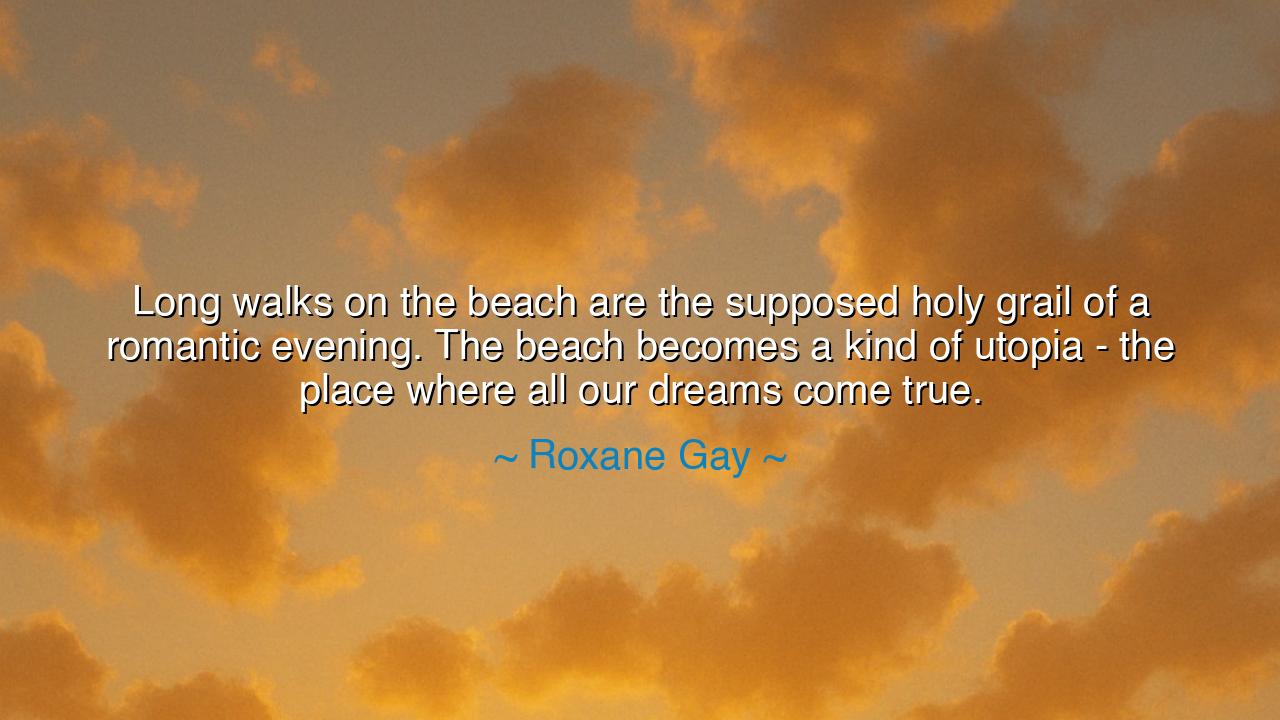
Long walks on the beach are the supposed holy grail of a romantic
Long walks on the beach are the supposed holy grail of a romantic evening. The beach becomes a kind of utopia - the place where all our dreams come true.






“Long walks on the beach are the supposed holy grail of a romantic evening. The beach becomes a kind of utopia — the place where all our dreams come true.” Thus spoke Roxane Gay, a writer of great perception, whose words pierce through the illusions of modern longing to reveal the deeper truths of the human heart. At first glance, her words appear to speak lightly — of romance, of soft waves, of lovers walking beneath the dying sun. But within this simple image lies a meditation on idealism, yearning, and the nature of human desire. For the beach, in Gay’s reflection, is not merely a place of sand and sea, but a symbol of perfection — the imagined utopia where we believe our hearts might finally find rest.
The beach has long stirred the imagination of humankind. It is the meeting place of two worlds — the land, where we live and labor, and the sea, vast and unknowable, symbol of the soul’s longing. To walk along that border is to walk at the edge of existence itself — half grounded, half dreaming. Thus, when Roxane Gay calls it the “holy grail of a romantic evening,” she speaks of how we, as a people, have made of the beach a myth of fulfillment. It is not the sand we seek, but what it represents — the stillness after struggle, the peace after pain, the dream of love without fear. Yet, like the holy grail itself, it is a vision often chased but seldom found, for no place, however beautiful, can bear the full weight of our desire.
In her wisdom, Gay unmasks the illusion: that the utopia we seek is not a location, but a longing. We yearn for a setting that might mirror the perfection we hope to feel within — a scene of harmony where the self is no longer divided. Yet such a place cannot be found upon the earth, for the human heart carries its own storms, as restless as the tides. The dreams we bring to the beach — of love eternal, of unbroken peace — rise and fall like waves, dissolving upon the shore. Still, we return again and again, as if by walking that border we might finally learn to balance our own inner worlds of land and sea.
This longing for the perfect moment — this utopian fantasy — has appeared in every age. The poets of ancient Greece sang of Elysium, the blessed fields beyond death where joy never fades. The philosophers of every civilization have dreamed of a city of virtue, where justice and harmony reign. Even lovers, in every time and culture, have sought a sacred place where their hearts might unite without the wounds of the world. But, as history teaches, every attempt to fix perfection in form ends in disappointment. The ideal dissolves when touched by reality — as footprints vanish beneath the tide. The beach, then, becomes a mirror of our own eternal yearning: beautiful, yes, but fleeting.
Consider the story of Antony and Cleopatra, whose love has been sung for centuries. They sought their own paradise upon the waters of the Nile — a love beyond duty, beyond empire, beyond time. For a moment, it seemed they had found it: the golden sails of their ship gleamed under the sun, and the world itself seemed to pause in reverence. Yet such perfection could not last. The tides of war, like the tides of the sea, returned to claim them, and their dream dissolved into legend. So it is with all who seek to make their utopia real — the very act of grasping it transforms it into something mortal.
In this way, Roxane Gay’s words are both tender and tragic. She speaks to the illusion of completion, to the way we build our ideals upon images that cannot hold them. The “long walk on the beach” is not false, but fragile — a fleeting moment of peace that reveals our deeper hunger. To seek such moments is not wrong; indeed, it is human. But to believe they can contain the fullness of our dreams is to mistake the reflection for the source. The beach is sacred not because it fulfills us, but because it reminds us how infinite our longing truly is.
Therefore, O seeker of wisdom, take this teaching to heart: do not chase the perfect moment — create meaning in the imperfect one. When you walk the shore, when you love, when you dream, do not demand that the world give you paradise. Instead, bring your peace into the moment, as the sun brings light to the sea. Recognize that the utopia you seek lies not in the place, but in the act of presence — in the quiet joy of being alive to the wind, the salt, and the company beside you.
For in the end, Roxane Gay reminds us that every dream of paradise — every beach, every sunset, every whispered promise — is a reflection of what already dwells within us. The ocean will always recede, the evening will always fade, yet the heart that has learned to find wonder in their passing will never be empty. So walk your beaches, real or imagined, not to find a world of perfection, but to remember that utopia lives not in the horizon, but in the spirit that dares to keep walking toward it.






AAdministratorAdministrator
Welcome, honored guests. Please leave a comment, we will respond soon